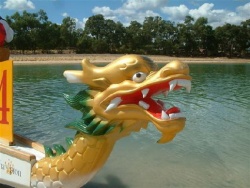Anavatapta
Anavatapta
[阿耨達竜王] (Skt; Jpn Anokudatsu-ryuo)
A dragon said to live in Anavatapta Lake, or Heat-Free Lake, north of the Snow Mountains. Anavatapta is one of the eight great dragon kings who joined those assembled to hear the Lotus Sutra, as described in the "Introduction" (first) chapter of the sutra. According to the Long Agama Sutra, although dragons are tormented by fiery heat, stripped of their jeweled clothing by fierce winds, and afraid of garuda birds that prey on them, the dragon king Anavatapta is free from all these distresses. For this reason this dragon is called Anavatapta, which means free from or not afflicted by heat. Anavatapta is also the name of the lake where the dragon king Anavatapta is said to dwell. See also dragon deity; eight great dragon kings.
....
Anavatapta (阿那婆達多 in Chinese and Japanese) is the lake lying at the center of the world, according to an ancient Buddhist cosmological view. The name Anavatapta means "heat-free"; the waters of the lake were thought to be able to soothe the fires that torment beings. Anavatapta is also the name of the dragon that lives in the lake; having become a Bodhisattva, it was free from the distresses that plague other dragons, which are tormented by fiery heat and preyed on by Garuda birds.
Lying south of Perfume Mountain, Lake Anavatapta is said to be 800 li in circumference and bordered by gold, silver, and precious stones. Four rivers issued from the lake. The earthly manifestation of the lake is often identified with Lake Manasarovar, which lies at the foot of Mount Kailash (Gandhamadana or Perfume Mountain) in the Himalayas. The four mythical rivers are sometimes identified with the Ganges (east), the Indus (south), the Oxus (west), and the Tarim or the Huang He (Yellow River, north).
One route by which this ancient Buddhist view of the cosmos passed from sixth-century China to Japan was via gardening. Such gardens often had a hill in the center, representing Mount Meru, and a pond symbolizing Lake Anavatapta (which became Munetsunochi (無熱悩池) or Munetsuchi (無熱池; "pond without heat") in Japanese).
